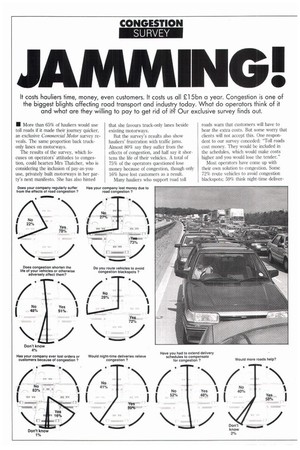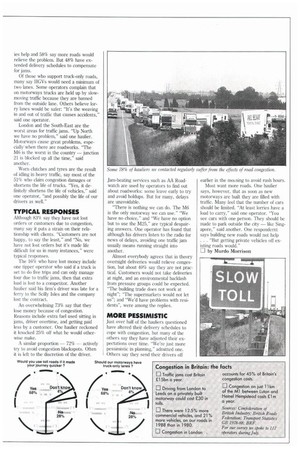It costs hauliers time, money, even customers. It costs us
Page 44

Page 45

If you've noticed an error in this article please click here to report it so we can fix it.
all El 5bn a year. Congestion is one of the biggest blights affecting road transport and industry today. What do operators think of it and what are they willing to pay to get rid of it? Our exclusive survey finds out.
• More than 65% of hauliers would use toll roads if it made their journey quicker, an exclusive Commercial Motor survey reveals. The same proportion back truckonly lanes on motorways.
The results of the survey, which focuses on operators' attitudes to congestion, could hearten Mrs Thatcher, who is considering the inclusion of pay-as-youuse, privately built motorways in her party's next manifesto. She has also hinted that she favours truck-only lanes beside existing motorways.
But the survey's results also show hauliers' frustration with traffic jams. Almost 80% say they suffer from the effects of congestion, and half say it shortens the life of their vehicles. A total of 75% of the operators questioned lose money because of congestion, though only 16% have lost customers as a result.
Many hauliers who support road toll roads warn that customers will have to bear the extra costs. But some worry that clients will not accept this. One respondent to our survey conceded: "Toll roads cost money. They would be included in the schedules, which would make costs higher and you would lose the tender."
Most operators have come up with their own solution to congestion. Some 72% route vehicles to avoid congestion blackspots; 59% think night-time deliver ies help and 58% say more roads would relieve the problem. But 48% have extended delivery schedules to compensate for jams.
Of those who support truck-only roads, many say HGVs would need a minimum of two lanes. Some operators complain that on motorways trucks are held up by slowmoving traffic because they are banned from the outside lane. Others believe lorry lanes would be safer: "It's the weaving in and out of traffic that causes accidents," said one operator.
London and the South-East are the worst areas for traffic jams. "Up North we have no problem," said one haulier. Motorways cause great problems, especially'when there are roadworks. "The M6 is the worst in the country — junction 21 is blocked up all the time," said another.
Worn clutches and tyres are the result of idling in heavy traffic, say most of the 51% who claim congestion damages or shortens the life of trucks. "Yes, it definitely shortens the life of vehicles," said one operator, "and possibly the life of our drivers as well."
TYPICAL RESPONSES
Although 83% say they have not lost orders or customers due to congestion, many say it puts a strain on their relationship with clients. "Customers are not happy, to say the least," and "No, we have not lost orders but it's made life difficult for us in many instances," were typical responses.
The 16% who have lost money include one tipper operator who said if a truck is set to do five trips and can only manage four due to traffic jams, then that extra load is lost to a competitor. Another haulier said his firm's driver was late for a ferry to the Scilly Isles and the company lost the contract.
An overwhelming 73% say that they lose money because of congestion. Reasons include extra fuel used sitting in jams, driver overtime, and getting paid less by a customer. One haulier reckoned it knocked 25% off what he would otherwise make.
A similar proportion — 72% — actively try to avoid congestion blackspots. Often it is left to the discretion of the driver. Jam-beating services such as AA Roadwatch are used by operators to find out about roadworks: some leave early to try and avoid holdups. But for many, delays are unavoidable.
"There is nothing we can do. The M6 is the only motorway we can use." "We have no choice," and "We have no option but to use the M25," are typical despairing answers. One operator has found that although his drivers listen to the radio for news of delays, avoiding one traffic jam usually means running straight into another.
Almost everybody agrees that in theory overnight deliveries would relieve congestion, but about 40% say they are not practical. Customers would not take deliveries at night, and an environmental backlash from pressure groups could be expected. "The building trade does not work at night"; "The supermarkets would not let us"; and "We'd have problems with residents", were among the replies.
MORE PESSIMISTIC
Just over hall ol the hauliers questioned
have altered their delivery schedules to cope with congestion, but many of the others say they have adjusted their expectations over time. "We're just more pessimistic in planning," admitted one. Others say they send their drivers off earlier in the mm fling to avoid rush hours.
Most want more roads. One haulier says, however, that as soon as new motorways are built they are filled with traffic. Many feel that the number of cars should be limited. "At least lorries have a load to carry," said one operator. "You see cars with one person. They should be made to park outside the city — like Singapore," said another. One respondernt says building new roads would not help . . . "But getting private vehicles off existing roads would."
LI by Murdo Morrison
















































































































